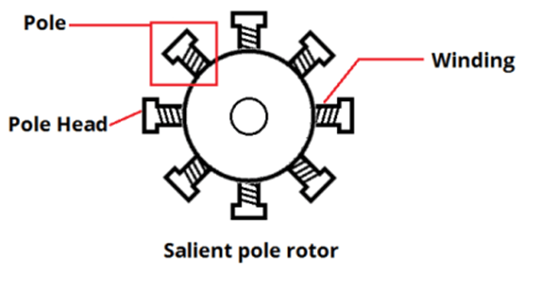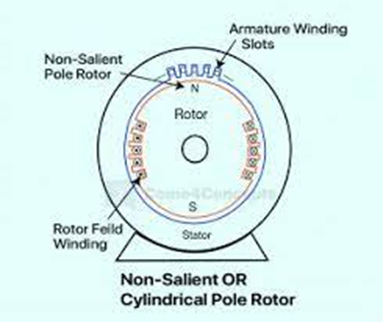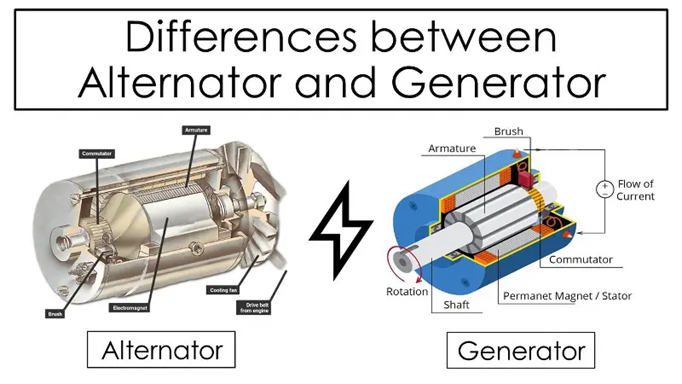Alternators and generators are mechanical devices that convert mechanical energy into electrical energy. Alternator and Generator differ from each other with respect to structure, efficiency, output, etc. The major point of difference between an alternator and a generator is that in an alternator, the magnetic field rotates around a stationary armature, and in a generator; the armature rotates inside a stationary magnetic field.
What is an Alternator?
An alternator is an electronic machine that produces Alternating Current by converting mechanical energy into electrical energy. Therefore, it is termed an AC generator or the synchronous generator. In the alternator i.e., AC generator, electricity is produced when a magnetic field spins inside the windings of the wire.
There are many types of alternators based on design and applications. Some of these are Marine type alternators, automotive-type alternators, Brushless type alternators, Diesel-electric locomotive-type alternators, etc. Alternators work by conserving energy by using only the energy which is needed.
What is a Generator?
A generator is a mechanical device that is responsible for converting mechanical energy into AC or DC electrical energy. A generator keeps providing electrical energy constantly even when it is not required. This is the reason a generator is less efficient than an alternator i.e., an AC generator. However, a generator can generate AC and DC, and the output voltage remains constant throughout the entire functioning. Thus, the generator is a perfect device to utilize as a backup power supply in offices, homes, industries, construction sites, etc. A generator can be put in to charge a battery that is completely drained.
Types of an Alternator
Based on the construction of the rotor, an alternator is of the following two types
Salient Pole Type
Cylindrical Pole Type.
Salient Pole Type
It consists of several poles; the rotor diameter is large in this machine and has a smaller axial length. The prime movers or turbines that are used have low speeds such as hydraulic turbines like the Pelton wheel, Kaplan, and Francis turbines. It is used for low and medium-speed applications. These are used in diesel power stations and hydropower stations. These are also called Hydro Alternators. The salient pole rotor type figure is shown below:

Cylindrical Pole Type
The number of poles used in this type is either 2 or 4. As the poles used are minimum, the rotor diameter is small, and the axial length is larger in these alternators. The speed of this type ranges between 1500-3000 rpm i.e., revolution per minute. The turbines or prime movers used here are of high speed such as the gas and steam turbine. The cylindrical rotor-type machine is shown below:

Types of Generators
There are mainly three types of Electric Generators:
Portable Generators
Standby Generators
Inverter Generators
Portable Generators
If we want to use a generator that is lightweight, reliable, safe to use, and soundproof, and outdoor enthusiasts, then installing portable generators outside is the best choice.
These residential generators are diesel-powered generators that provide temporary electrical power.
We use them to fulfil our essential home power needs during power outages, for power tools needed during projects, and for powering cabin appliances.
Standby Generators
It is worry-free, i.e., we don’t need to refill for weeks for its functioning.
It is sized to power an entire house in the event of an outage.
It is an electrical backup system.
It runs automatically.
Inverter Generators
If we prefer the output on low energy emissions and a small, quiet working device, then installing the inverter generator would be the best option.
An inverter generator electronically controls the movement of the engine to fulfill our electricity demand instead of running full tilt all the time.
Differences between an Alternator and a Generator
An alternator is a device that converts mechanical energy into AC electrical energy whereas a generator is a mechanical device that converts mechanical energy to either AC or DC electrical energy.
An alternator always induces an alternating current whereas a generator can generate either alternating or direct current.
Alternators are very efficient whereas Generators are considered less efficient.
Alternators use only the required amount of energy and thus, it conserves more energy whereas generators use all the energy that is produced, so they conserve less energy.
The magnetic field is rotating inside the stator of an alternator whereas, in the case of a generator, the magnetic field is stationary or fixed where the armature winding spins.
Alternators have a higher output than generators whereas alternators have a higher output than generators.
Alternators have a wide range of RPM whereas alternators have a wide range of RPM.
The brushes of alternators last longer i.e., more efficient whereas the brushes of generators last lesser when compared to an alternator.
Alternators produce voltage only when needed whereas generators always produce voltage.
The alternator takes the input supply from the stator whereas the generator takes the input supply from the rotor.
Recommended Articles:
Dielectrics: Introduction, Materials, Molecules, Polarization And constant
Dielectric Properties: Introduction, Constant, Strength, And Applications
Difference Between Ac And Dc Generator
Differences between Air Conditioning and Refrigeration
Difference Between Alcohol And Phenol
A generator is a mechanical device that is responsible for converting mechanical energy into AC or DC electrical energy. A generator keeps providing electrical energy constantly even when it is not required. Based on the construction of the rotor, an alternator is of the following two types Salient Pole Type, Cylindrical Pole Type. Alternators are very efficient whereas Generators are considered less efficient. Alternators use only the required amount of energy and thus, it conserves more energy whereas generators use all the energy that is produced, so they conserve less energy. A magnetic field is a vector field that describes the magnetic influence on moving electric charges, magnetic materials, and electric currents Difference between Alternator and Generator FAQs
What is a generator?
What are the types of alternators?
State any two differences between an alternator and a generator.
what do you mean by Magnetic field?
